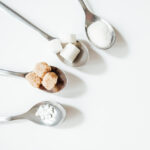New research links chemical found in popular artificial sweetener to DNA damage
 (NaturalHealth365) Artificial sweeteners taste similar to sugar yet have basically ‘no calories.’ In fact, the average teaspoon of artificial sweeteners has less than three calories per teaspoon – which is why these products are so “attractive” to the uneducated consumer. For example, those living with diabetes often consume artificial sweeteners because they are told there’s ‘no impact on blood sugar,’ when compared to regular sugar. However, recent studies indicate that eating an artificial sweetener will do much more harm than good, as you’ll soon see below.
(NaturalHealth365) Artificial sweeteners taste similar to sugar yet have basically ‘no calories.’ In fact, the average teaspoon of artificial sweeteners has less than three calories per teaspoon – which is why these products are so “attractive” to the uneducated consumer. For example, those living with diabetes often consume artificial sweeteners because they are told there’s ‘no impact on blood sugar,’ when compared to regular sugar. However, recent studies indicate that eating an artificial sweetener will do much more harm than good, as you’ll soon see below.
One example to be concerned about is research that shows a chemical found in some of the most popular artificial sweeteners can cause DNA damage. The analysis of sucralose proves its samples have 0.67% sucralose-6-acetate. The consumption of this acetate has the potential to cause harm to DNA.
Artificial sweeteners are a direct threat to the building block of life
Recent clinical studies have shed light on the potential dangers associated with the consumption of sucralose-6-acetate, raising concerns about its impact on vital biological processes. These findings have revealed a significant increase in gene expression linked to cancer, oxidative stress, and inflammation. Of particular concern is the heightened gene expression observed in the metallothionein 1 G gene, abbreviated as MT1G.
Additionally, sucralose and its acetate derivatives have been found to compromise the integrity of intestinal barriers, further exacerbating the potential risks. Notably, the acetate component hinders the proper functioning of two crucial members of the cytochrome P450 family, posing additional threats to human health.
Examining the genotoxic effects of sucralose and its implications for human health
Recent research has delved into the genotoxic properties of sucralose, uncovering concerning evidence regarding its impact on DNA integrity. Genotoxicity, a term used by scientists, indicates the ability of sucralose to cause DNA damage. This chemical compound is present in artificial sweeteners and is also formed as a byproduct during the process of digestion. Notably, fat-soluble compounds such as sucralose-6-acetate are produced in the gut following the ingestion of sucralose.
The critical question arises as to whether even minimal consumption of sucralose can be considered safe for human health. The European Food Safety Authority has set a threshold of 0.15 micrograms for daily consumption, beyond which this genotoxic substance poses a threat.
Research has revealed that even negligible amounts of acetate obtained through the consumption of sucralose-sweetened beverages exceed the 0.15 microgram threshold for health. Furthermore, the extent of damage caused by this compound, once metabolized, is still being quantified.
This damage manifests in the form of DNA fragmentation within cells exposed to the chemical, with potentially significant repercussions.
Sucralose is a direct threat to gut health
Extensive studies have illuminated the detrimental effects of sucralose on the delicate balance of gut health. When sucralose, in conjunction with its derivative sucralose-6-acetate, is exposed to the epithelial tissues that form the intestinal wall, a concerning condition known as leaky gut emerges. In simple terms, leaky gut refers to an abnormally permeable gastrointestinal tract. Artificial sweetener compounds compromise the interfaces or junctions that connect the cells within the gut wall, exacerbating the issue.
A leaky gut poses significant long-term health problems, disrupting the normal excretory system functionality by hindering the proper elimination of particles from the body. Consequently, these particles find their way into the bloodstream, hijacking the excretory process. Gut cells exposed to sucralose-6-acetate exhibit heightened gene activity associated with oxidative stress, carcinogenicity, and inflammation, further exacerbating the health implications.
Symptoms commonly associated with leaky gut include regular indigestion, bloating, food sensitivities, and abdominal pain, highlighting the disruptive impact of this condition on overall well-being.
Embrace healthier choices and say no to artificial sweeteners
It’s time to resist the allure of artificial sweeteners, with one of the most commonly known being sucralose, often marketed as Splenda. Splenda products range from artificial sweetener packets to sweet tea, shakes, and coffee creamers.
Instead of indulging in Splenda and other beverages or foods containing artificial sweeteners, it’s wise to opt for natural alternatives. Quench your thirst and add flavor to water by incorporating slices of organic lemon or lime, providing a refreshing taste while keeping you well hydrated.
Sources for this article include:
Tandfonline.com
News-medical.net
Sciencetimes.com
Medicaldaily.com
Medicalxpress.com



